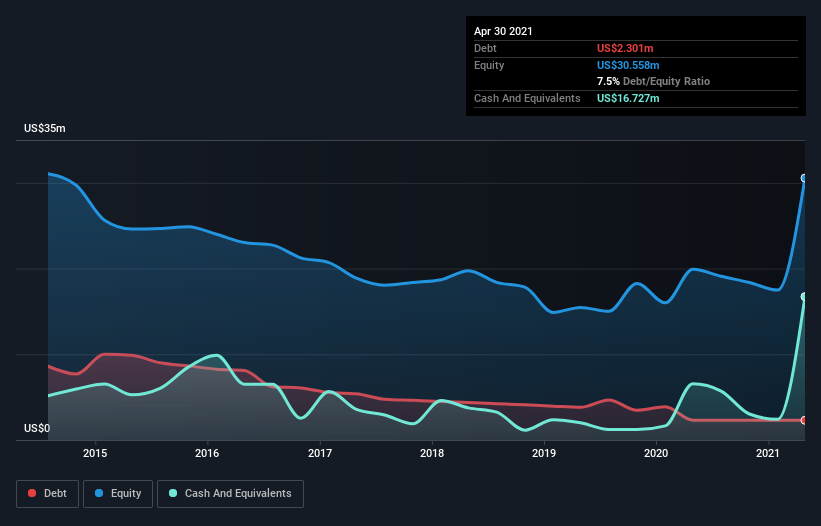Is Streamline Health Solutions (NASDAQ:STRM) Using Debt In A Risky Way?
- Oops!Something went wrong.Please try again later.
Legendary fund manager Li Lu (who Charlie Munger backed) once said, 'The biggest investment risk is not the volatility of prices, but whether you will suffer a permanent loss of capital.' So it seems the smart money knows that debt - which is usually involved in bankruptcies - is a very important factor, when you assess how risky a company is. Importantly, Streamline Health Solutions, Inc. (NASDAQ:STRM) does carry debt. But the more important question is: how much risk is that debt creating?
What Risk Does Debt Bring?
Debt and other liabilities become risky for a business when it cannot easily fulfill those obligations, either with free cash flow or by raising capital at an attractive price. Ultimately, if the company can't fulfill its legal obligations to repay debt, shareholders could walk away with nothing. While that is not too common, we often do see indebted companies permanently diluting shareholders because lenders force them to raise capital at a distressed price. By replacing dilution, though, debt can be an extremely good tool for businesses that need capital to invest in growth at high rates of return. When we examine debt levels, we first consider both cash and debt levels, together.
Check out our latest analysis for Streamline Health Solutions
How Much Debt Does Streamline Health Solutions Carry?
The chart below, which you can click on for greater detail, shows that Streamline Health Solutions had US$2.30m in debt in April 2021; about the same as the year before. However, its balance sheet shows it holds US$16.7m in cash, so it actually has US$14.4m net cash.
A Look At Streamline Health Solutions' Liabilities
The latest balance sheet data shows that Streamline Health Solutions had liabilities of US$9.14m due within a year, and liabilities of US$346.0k falling due after that. Offsetting these obligations, it had cash of US$16.7m as well as receivables valued at US$3.44m due within 12 months. So it actually has US$10.7m more liquid assets than total liabilities.
This excess liquidity suggests that Streamline Health Solutions is taking a careful approach to debt. Given it has easily adequate short term liquidity, we don't think it will have any issues with its lenders. Simply put, the fact that Streamline Health Solutions has more cash than debt is arguably a good indication that it can manage its debt safely. There's no doubt that we learn most about debt from the balance sheet. But it is future earnings, more than anything, that will determine Streamline Health Solutions's ability to maintain a healthy balance sheet going forward. So if you want to see what the professionals think, you might find this free report on analyst profit forecasts to be interesting.
In the last year Streamline Health Solutions's revenue was pretty flat, and it made a negative EBIT. While that hardly impresses, its not too bad either.
So How Risky Is Streamline Health Solutions?
By their very nature companies that are losing money are more risky than those with a long history of profitability. And we do note that Streamline Health Solutions had an earnings before interest and tax (EBIT) loss, over the last year. Indeed, in that time it burnt through US$3.2m of cash and made a loss of US$6.3m. With only US$14.4m on the balance sheet, it would appear that its going to need to raise capital again soon. Overall, its balance sheet doesn't seem overly risky, at the moment, but we're always cautious until we see the positive free cash flow. When analysing debt levels, the balance sheet is the obvious place to start. But ultimately, every company can contain risks that exist outside of the balance sheet. For example - Streamline Health Solutions has 4 warning signs we think you should be aware of.
When all is said and done, sometimes its easier to focus on companies that don't even need debt. Readers can access a list of growth stocks with zero net debt 100% free, right now.
This article by Simply Wall St is general in nature. It does not constitute a recommendation to buy or sell any stock, and does not take account of your objectives, or your financial situation. We aim to bring you long-term focused analysis driven by fundamental data. Note that our analysis may not factor in the latest price-sensitive company announcements or qualitative material. Simply Wall St has no position in any stocks mentioned.
Have feedback on this article? Concerned about the content? Get in touch with us directly. Alternatively, email editorial-team (at) simplywallst.com.


